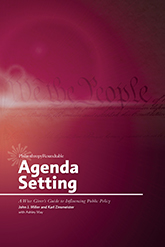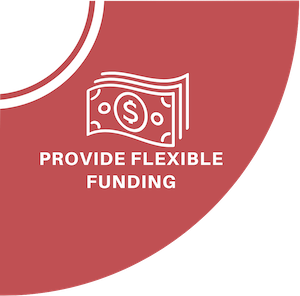Site Search
- resource provided by the Forum Network Knowledgebase.
Search Tip: Search with " " to find exact matches.

General Operating Support or General Project Support
Affirmation: Funds with the least restrictions are the most valuable
Nonprofits maintain and strengthen their organizations when their funds are unrestricted. Data shows flexible and reliable funding increases impact when nonprofit leaders have control over how funds flow to meet the needs of their constituents and internal operations, as demonstrated during the pandemic when funders released previously restricted funding. General operating support (GOS) funding signals trust in our partners and can open more honest dialogue about meeting the mutual goals of the funder and nonprofit. Funders who make project or program grants should trust the organization and provide flexible funding within a specific program.
Activities
• Over the short term, funders aim to shift their GOS activity by 30%. (30% more grants shift from program to GOS, or from fully restricted to negotiated GOS.)
• Provide grants as unrestricted organizational general operating support. The long-term ideal is for most, if not all, grants to be 100% GOS, unless a funder is legally precluded from doing otherwise.
• For project/program grants, 100% of the grant awarded is unrestricted (negotiated GOS), applying mission-based and mutually negotiated outcomes.
• Nonprofits articulate their organizational vision, strategies and intended outcomes to funders; funders understand the models of their grantee partners and learn from them how the grantee partner's work will lead to change.
• Trust nonprofit partners to know how to best apply their funding.
• Create a shared understanding of the meaning and importance of full-cost budgeting and real-cost funding.
Short-term Outcomes
• 70% of funders are shifting some of their distribution to making general operating support grants.
• 100% of program/project grants are designated unrestricted.
Long-term Outcomes
• 100% of all grants are made without restrictions, unless limited by covenant or donor wishes in the case of community foundations.
• All nonprofits can clearly articulate their vision, strategies, outcomes, and business models to funders; and funders understand them and trust them to know how best to use their funds.
How to Begin Doing Good Better on Flexibility Learning Opportunities
• Why aren’t some funders planning to award GOS or negotiate GOS?
• Ask funders: If you participated in CNJG’s 2022 funder survey and indicated that you planned to initiate GOS, have you done so? • Why are some grants restricted?
• What would it take for funders to change?
Pre-Work
• Seek and share learning opportunities for funders, prioritizing education of foundation boards, to address the barriers to awarding GOS and understand how restricted funding undermines financial sustainability.
• For funders who already regularly provide GOS funding, educate/advocate for others to do the same.
• Learn how GOS/negotiated GOS strengthens grantee partners and the multiple ways they can use and evaluate GOS. Actively seek insights from nonprofits to reinforce the message about GOS in their funding partnerships.
• As an incremental step for funders that are not receptive to GOS, provide education about negotiated general programming support (flexible funding within a mutually agreed-upon program area, as opposed to organization-wide GOS).
• Share promising practices on evaluation of GOS and negotiated GO
This session will unpack New Jersey’s just-enacted Fiscal Year 2026 state budget—totaling $58.1 billion—with a $6.3 billion surplus. We’ll explore key spending priorities, looming threats from federal funding cuts, and the implications for the transition to the next governor.
Peter Chen, Esq. (he/him), Senior Policy Analyst at New Jersey Policy Perspective, serves as tax and budget lead, coordinating analysis of state and local fiscal policy. Peter has worked on child and family policy advocacy in New Jersey since 2014. Most recently, he spearheaded New Jersey’s creation of a state-level Child Tax Credit. Peter’s work has included coordination of the statewide nonprofit Census complete count campaign, advocacy to strengthen state and local laws to protect children from lead exposure, and reducing chronic absenteeism from school. Previously Peter served as Policy Counsel for Advocates for Children of New Jersey. Peter received his JD from Yale Law School and his Bachelors of Arts from Indiana University-Bloomington.
Tina M. Zappile is the Director of the William J. Hughes Center for Public Policy at Stockton University where she is also Associate Professor of Political Science. She earned her Ph.D. in International Relations and M.A. in International Trade and Finance from the University of Nebraska-Lincoln, and her M.A. in Political Science and B.A. from the University of Nevada, Las Vegas. Her research interests include international organizations (IOs), international law, international trade and finance, the North-South divide, global economic development policy, and the role of developing countries in IOs and the global economy. She teaches classes in international law and organization, global politics of economic development, introduction to international relations, and international political economy.
Cost: Free for CNJG Members; $75 for Non Member Grantmakers
This program is only open to staff and trustees from grantmaking organizations.
Webinar Video
Nonprofits can and should play an active role during elections, particularly by educating and activating voters. However, with important local, state and federal elections coming up this fall, nonprofits should take the time to remind their staff about appropriate activity during a political campaign or at any other time. This overview developed by Donors Forum provides important tips and examples of activities that are permissible for nonprofits during an election cycle.
A CNJG member queried our listserves with the question "Does anyone have templates that can be used and/or shared related to grant approval letters and terms and conditions related to COVID-19 grants?" CNJG compiled the answers from responding members.

